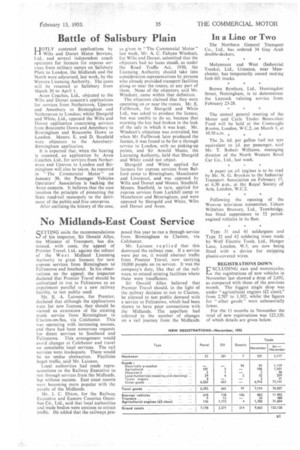Battle of Salisbury Plain
Page 35

If you've noticed an error in this article please click here to report it so we can fix it.
llOTLY contested applications by Wilts and Dorset Motor Services, Ltd., and several independent coach operators for licences for express services from military camps on Salisbury Plain to London, the Midlands and the North were adjourned, last week, by the Western Licensing Authority. The cases will be resumed at Salisbury from March 30 to April 1.
Avon Coaches, Ltd., objected to the Wilts and Dorset concern's applications for services from Netheravon, Upavon and Amesbury to Birmingham and Netheravon to London; whilst Shergold and White, _Ltd., opposed the Wilts and Dorset application concerning services from Boscombe Down and Amesbury to Birmingham and Boscombe Down to London. Messrs. E. and D. Stanfield were objectors to the AmesburyBirmingham application.
It is expected that, when the hearing is resumed, an application by Avon Coaches, Ltd., for services from Netheravon and Upavon to London and Birmingham will also be taken. As reported in " The Commercial Motor" on January 30, the Passenger Vehicles Operators' Association is backing the Avon concerti. It believes that the case involves the principle of protecting the State road-rail monopoly to the detriment of the public and free enterprise.
After outlining the history of the case, as given in "The Commercial Motor" last week, Mr. A. C. Fabyan Windeatt, for Wilts and Dorset, submitted that the objectors had no locus standi, as under the Road Traffic Act, 1930, the Licensing Authority should take into consideration representations by persons who already provided transport facilities along or near the routes, or any part of them. None of the objectors, said Mr. Windeatt, came within that definition.
The objectors claimed that they were operating on or near the routes. Mr. E. Fullbrook, for Shergold and White Ltd., was asked to produce the licence, but was unable to do so, because that morning the key had broken in the lock of the safe in which it was kept. Mr. Windeatt's objection was overruled, but when Mr. Fullbrook later produced the licence, it was found to be for a through service to London, with no picking-up points, and Sir Arnold Musto, the Licensing Authority, held that Shergold and White could not object.
Shergold and White applied for licences for express services from Bulford camp to Birmingham, Manchester and Liverpool, and was opposed by Wilts and Dorset and Messrs. Stanfield. Messrs. Stanfield, in turn, applied for express services from Larkhill camp to Manchester and Birmingham, and were opposed by Shergold and White, Wilts and Dorset and Avon.




















































































